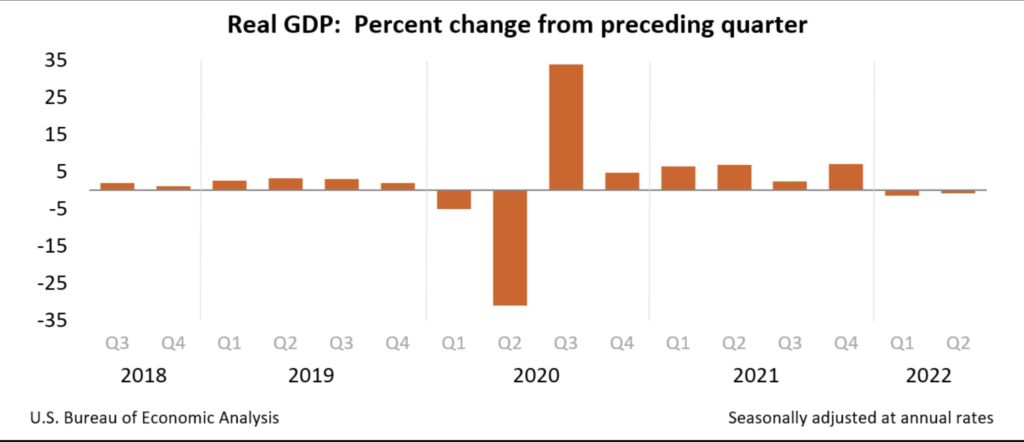Are we in a recession?
Seems to be the question on a lot of people’s minds. Earlier today, the Bureau of Economic Analysis (BEA) released GDP data for the second quarter of this year. And according to the new data, the economy shrank by 0.9 percent (annualized). This is less than what most estimates predicted and is also less than the rate at which the economy shrank in the first quarter of this year — 1.6 percent (annualized).

How is a recession defined?
Anticipating the bad news about GDP, prior to the BEA announcement, the White House put out a statement cautioning people that even if the GDP data for the second quarter of this year came out negative, we would not be in a recession.
Even Janet Yellen has said that the US economy is not in a recession, but is rather in a transitory period whereby growth seems to be slowing.
Are they right?
Technically, there is no one right rule for defining a recession. But for most people, the rule of thumb is that if the economy shrinks for two consecutive quarters, then there is a recession.
But the National Bureau of Economic Research (NBER) — one of the country’s authoritative bodies on economic research — does not accept this definition. The NBER instead looks at the overall level of economic activity and defines a recession as “a significant decline in economic activity that is spread across the economy and that lasts more than a few months.”
And while technically speaking most of the periods that NBER has designated as recessions have consisted of “two or more consecutive quarters of declining GDP”, that has not always been the case. As the NBER explains,
In 2001, for example, the recession did not include two consecutive quarters of decline in real GDP. In the recession from the peak in December 2007 to the trough in June 2009, real GDP declined in the first, third, and fourth quarters of 2008 and in the first and second quarters of 2009. Real GDI declined for the final three quarters of 2001 and for five of the six quarters in the 2007–2009 recession.
Recession or not, this is a concerning trend
We are certainly living in interesting times, so it’s normal to wonder what exactly is going on with the economy. For example, while GDP has shrunk for two consecutive quarters, employment has been expanding, and so has consumer spending. In Minnesota, unemployment is at the lowest any state has ever had in history.
With some of these indicators showing some strong growth, it makes sense that there is a debate on whether we are officially in a recession or not.
But regardless of whether we call it a recession or not, there is no question that this is not a good trend, especially considering the extremely high rate of inflation.